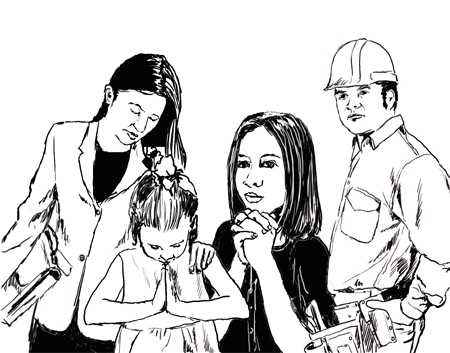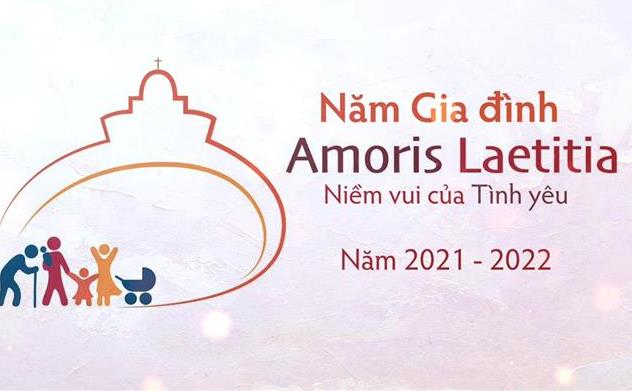 12 Sunday of the Year B
12 Sunday of the Year B
Job 38:1, 8-11; 2Cor 5:14-17; Mk 4:35-41
Introduction: This is a homily/Scripture reflection in a book, titled: ‘Every Week God Speaks We Respond’, Cycle B, intended to be published in the future by Reverend John Tran Binh Trong.
It was published in Vietnamese in the US 2008 and republished in Viet Nam 2011. To keep the author’s writing style, this homily has not been edited and may not be by a hired hand. However, if readers would like to point out mistake(s) in spelling and grammar and/or to suggest English phrases and expressions, it would be greatly appreciated by the author, whose English is not his mother tongue and who did not live in the US until his adulthood. Passive sentences are used intentionally in this context as to avoid using the first personal pronoun ‘I’ when applicable, that might be associated with any idea of egotism, in accord with the French saying, known as: ‘Le moi est haissable’ (The ego is detestable).
Usually when facing danger, people become frightened. That is the natural reaction of human beings. Each person expresses his/her fear differently, depending on male, female, or degree of daring. It is assumed that when facing danger, women tend to be panic-stricken and screaming.
For men, they tend to be more self-controlled. Facing an object of fear, some people let go, resigning themselves to their fate. Others find way to escape. Still others decide to stay and fight back. Besides fears with clear objects, people can face fear that lasts through life without clear objects.
The Gospel of today tells us the apostles became frightened, when they faced waves and storms. They woke Jesus up when he was sleeping in the stern, imploring him for help. It was something that seemed necessary to do. Whether he was actually sleeping or he just feigned sleep in order to test the apostles’ faith, it was unknown. Yet Jesus complained saying: Why are you terrified? Do you not yet have faith? (Mk 4:40). Jesus’ point here is the apostles must have had faith in him continuously in all the circumstances of life, not just implored him for help when facing difficulties and dangers.
Like the apostles, we might have faced waves and storms at sea on a tourist or fishing boat or on an escape boat to freedom. We also might have faced waves and storms of life.
Waves and storms of life might have been heavy temptations, illicit love relationships, torments in spirit and doubts about God’s existence. Waves and storms of life can happen to anyone: the good and bad, believers and non-believers.
Today each one of us must examine how we dealt with God. Did we ever implore God for help only when facing dangers such as high winds and waves at high seas? Having reached destination, we then forgot God. Did we only pray to God when we were sick and suffered? Did we only pray to God when we were rejected or betrayed? Did we only pray to God when we lost our job or business?
In sum, we only prayed to God, asking for a favor such as to pass an exam, to get a job or to be healed from sickness or disease. When things have been achieved or passed, we store God in a box God or put him on the pedestal. Oftentimes people considered God as a last resort to pray to when facing a danger and test.
We wait until storms arise to plead God for help. At other times, we tend to forget God. We want to solve everyday problems without thinking of God and without asking God for help. We only ask God for help when every means has been used without result when we have been in a desperate situation with no way to be saved. In a state of no way to help, we call upon God as a last resort to see if he can do something.
The story of Job’s faith in God in today’s liturgy of the word must be an example for us. Job was a wealthy and noble man. He possessed the spirit of fear of the Lord, always keeping God’s commandments. When facing difficulties, losing possessions, wife and children, he was still faithful to God.
He considered suffering in this life as a mystery, which man could not understand with his mind (Job 38:8-11). In order to be faithful to God in great trials, Job had to be faithful to God in small matters in everyday life. In order to be faithful to him in great trials, the martyrs had to be faithful to God in everyday small matters, before they could move on to execution grounds. Our relationship with God is similar to the relationship between a husband and wife at their wedding vows: I promise to be true to you in good times and in bad, in sickness and in health. I will love you and honor you all the days of my life (Rite of marriage).
The faithful must promise to God more than that so that he/she may keep trust and faith in him in good times and in bad, in sickness and in health all the days of his/her life. God wants us to seek him, put our faith and hope and trust in him in all the circumstances of life, not just in difficulties and dangers.
God wants us to put our faith and trust in him like little children who keep their trust and faith in their parents.
Prayer for trust and faith in God in all circumstances of life:
Oh, Lord my God!
On the sea of life once, I felt saddened and fearful:
for my fate and my dark future.
While I stand in a thorny road junction,
not knowing which way to go,
send forth your angel to guide me.
When darkness covers my way,
shine your light to show my steps.
If I find beautiful and rare flowers and breeze on the road,
let me not forget you but teach me to say thank you.
Be the Lord of my life and my heritance. Amen.
John Tran Binh Trong



 Every Week God Speaks – We Respond, Cycle A was published Online in the US. The introduction of the book is recorded at “Sách của Tác giả Chủ trương, Column 1.
Every Week God Speaks – We Respond, Cycle A was published Online in the US. The introduction of the book is recorded at “Sách của Tác giả Chủ trương, Column 1.

 Năm Mục Vụ Giới Trẻ 2021. HĐGM ấn định một chương trình Mục vụ Giới trẻ 3 năm với các chủ đề tương ứng: Năm 2020: Đồng hành với người trẻ hướng tới sự trưởng thành toàn diện.
Năm Mục Vụ Giới Trẻ 2021. HĐGM ấn định một chương trình Mục vụ Giới trẻ 3 năm với các chủ đề tương ứng: Năm 2020: Đồng hành với người trẻ hướng tới sự trưởng thành toàn diện. Năm Thánh Giu-se: Nhân kỷ niệm 150 năm Đức Giáo hoàng Pio IX chọn thánh Giuse làm Đấng Bảo Trợ Giáo Hội Công Giáo, Đức Phanxicô đã ban hành Tông thư “Patris corde” – Trái tim của người Cha – và công bố “Năm đặc biệt về thánh Giuse” từ
Năm Thánh Giu-se: Nhân kỷ niệm 150 năm Đức Giáo hoàng Pio IX chọn thánh Giuse làm Đấng Bảo Trợ Giáo Hội Công Giáo, Đức Phanxicô đã ban hành Tông thư “Patris corde” – Trái tim của người Cha – và công bố “Năm đặc biệt về thánh Giuse” từ  Năm “Gia đình Amoris Laetitia” 2021 về “Vẻ đẹp và niềm vui của tình yêu gia đình” do Bộ Giáo Dân, Gia Đình và Sự Sống tổ chức, được Đức Phanxicô khai mạc dịp Lễ Thánh Giuse
Năm “Gia đình Amoris Laetitia” 2021 về “Vẻ đẹp và niềm vui của tình yêu gia đình” do Bộ Giáo Dân, Gia Đình và Sự Sống tổ chức, được Đức Phanxicô khai mạc dịp Lễ Thánh Giuse 
